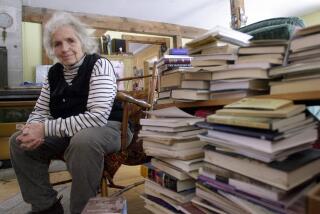Op-Ed: How <em>’Je suis Charlie’</em> makes matters worse
- Share via
The public response to the massacre of journalists at Charlie Hebdo has been articulated as a gesture of solidarity: “Je suis Charlie.” It has been chanted by marchers in the Place de la Republique, and repeated on Hollywood stages. It has the appeal of hashtag simplicity and bumper sticker righteousness.
But despite its seductive simplicity, that gesture not only fails to address the urgent cultural and political problems that led to the massacre, it also has made them far worse. It hardens the “us”/”them” opposition between a supposedly tolerant and liberal West and its supposedly intolerant and violent antagonist, the Muslim East.
The rush to identify with Charlie Hebdo is not just about commemorating massacred journalists, but also about celebrating Western culture, especially freedom of expression. The weekly — whose main claim to fame in recent years has been the relentless lampooning of Islam — has all too hastily been made a symbol of that principle. To “be Charlie” means to affiliate yourself with freedom of speech in absolute terms, as a core element of Western civilization.
Yet there is no such thing as absolute freedom of speech. There are always limits to what can be said, how, and in what context. Especially in France, speech is subject to strict — albeit selectively enforced — legal constraints. There are laws against hate speech and against speech taken to be supportive of political violence.
For the last several years, for example, the Cameroonian French satirical comedian Dieudonné M’bala M’bala has been repeatedly charged and convicted of anti-Semitic hate speech because his stand-up routine contained material that is no doubt offensive to some, and because of his infamous “quenelle,” which some see as an inverted Nazi salute. The French government has worked assiduously to ban his shows. No sooner had the government finished celebrating free speech last Sunday, than it had arrested Dieudonné because of a Facebook post that conflated “Je suis Charlie” with the name of one of the Paris gunmen.
Even Charlie Hebdo has it limits. In 2008 it fired one of its cartoonists, Maurice Sinet, for what was taken to be an anti-Semitic slur.
It is clear, then, that in France some satirical hate speech is intolerable and will be vigorously prosecuted, while other satirical hate speech, directed against different racial or ethnic targets — in particular France’s Muslim minority — is not only permissible but has now become the centerpiece of a celebration of supposedly Western values.
This is particularly problematic because, looming behind the whole Charlie affair, there is a colonial and post-colonial conflict that has been for far too long articulated along exactly the same “us”/”them” binary lines: “We” in the West are rational, good, modern and free (just don’t bring up the sordid legacy of colonialism, slavery, religious wars, etc.), while “they” are backward, bad, irrational and violent. This binary structure has been used since the late 18th century to justify the use of large-scale violence against Muslims, from Napoleon’s invasion of Egypt and the French occupation of Algeria to the current French bombardments of North Africa and Iraq, all of which at least partly set the stage for the recent violent outburst.
Charlie Hebdo has had many satirical targets, but it also has insinuated itself firmly into this structure, with its long-running series of derogatory cartoons directed against Muslims. This strays far from the original function of satire. The great satirists, including Swift, Byron and Molière, didn’t direct their barbs at reviled and vulnerable minorities. On the contrary, they used satire to expose the vices and the flaws of the self-confident and the powerful. Charlie Hebdo’s satire, in contrast, descended into mere racist taunting and baiting.
And, as though on cue, the deluded young men who carried out the Paris attacks fell for the bait. “You” dare make fun of “us,” they said, then “you” will pay the price; “we” will turn the tables. Their act of violence was clearly wrong and misguided, but what was equally misguided — and at least as dangerous in the long run — is the binary cultural and racial logic behind it.
For the attackers were born and raised in France. They were as French and as Western as their victims. Or were they not?
What does it mean to be French or Western? What does it mean to be one of “us” as opposed to one of “them”? Modern questions of inclusion and exclusion are infinitely complicated, and all of us urgently need to think about them in a collective conversation. Rallying around a simplistic slogan such as “Je suis Charlie” doesn’t further that conversation, it retards it.
Every culture has its mix of tolerance and intolerance, right and wrong, freedom and its absence. Learning about the deep continuities and profound forms of exchange and mutuality among cultures, religions and ethnic groups, as well as their vast internal differences, is a much more productive way of trying to prevent further tragedies than merely mindlessly celebrating how great “we” are, and how despicable “they” are, all over again.
Saree Makdisi, a professor of English and comparative literature at UCLA, is the author of “Making England Western: Occidentalism, Race and Imperial Culture.”
Follow the Opinion section on Twitter @latimesopinion
More to Read
A cure for the common opinion
Get thought-provoking perspectives with our weekly newsletter.
You may occasionally receive promotional content from the Los Angeles Times.






